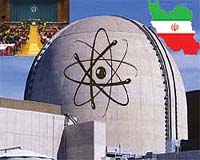| . |  |
. |
Tehran (AFP) Nov 30, 2009 Iran accused the UN atomic watchdog on Monday of applying the "law of the jungle" as Washington called Tehran's plans for new uranium plants unacceptable and Britain and Germany warned of new sanctions. A defiant Foreign Minister Manouchehr Mottaki said Tehran will continue enriching uranium, the most controversial aspect of its nuclear programme, after President Mahmoud Ahmadinejad's government declared plans for 10 new enrichment plants. Western powers led by Washington fear the Islamic republic's enrichment programme could be used by Iran to make atomic weapons, a charge it denies. Washington's UN ambassador Susan Rice warned that the dual-track approach of President Barack Obama's administration on Iran could soon shift from engagement to "pressure." "We view the Iranian announcement, if it is in fact accurate and implemented that they intend to build 10 additional facilities, as completely inappropriate and further isolating Iran from the international community. We view that frankly as unacceptable," she said. "And while we have been and will remain in close consultation with our P5+1 partners on the way forward, we have said that this is a dual track effort." The P5+1 -- permanent UN Security Council members Britain, China, France, Russia and the United States plus Germany -- has been negotiating for months with Iran over its nuclear activities. Javier Solana, on his last day as EU foreign policy chief, said he regretted Tehran's decision on the new plants. "I lament that they have taken this decision. I still hope there will be a possibility to change their mind," he told reporters. Mottaki called Friday's International Atomic Energy Agency (IAEA) resolution condemning Tehran for building a second uranium enrichment plant "illogical," saying it "destroys" the very foundation on which the UN nuclear body is based. The plant near the Shiite holy city of Qom is seen as defying the UN Security Council which has imposed three sets of sanctions on Iran for enriching uranium at its first plant in the central city of Natanz. "This is an act of bullying. Today, we call it the law of the jungle. Such measures will destroy the very foundation of the UN Security Council and the IAEA," Mottaki told a joint news conference with visiting Russian Energy Minister Sergei Shmatko. He said enriching uranium was Iran's right as it has been a Non-Proliferation Treaty (NPT) member for nearly four decades. Angered by the IAEA resolution, which was also backed by Tehran's close trade partners Russia and China, Ahmadinejad's government on Sunday declared Iran would build 10 new Natanz-size uranium enrichment plants. "We had no intention of building so many sites... but apparently the West does not want to understand Iran's message of peace and the way they behaved persuaded the government to pass a decree to build 10 sites like Natanz," Iran's atomic chief Ali Akbar Salehi told public radio. In Paris, French Foreign Minister Bernard Kouchner branded Iran's threat "ridiculous" and "childish." Defence Minister Herve Morin, citing what he said was evidence "from the intelligence services of several countries, notably France," said: "The uranium enrichment programmes have no other goal than a military goal." The West, infuriated by Iran's disclosure of the Qom plant, wants Tehran to agree to an IAEA-brokered deal which envisages sending its stocks of low-enriched uranium (LEU) abroad in one go. Iran has rejected the proposal, saying it would export its LEU only if it gets enriched fuel for a Tehran research reactor at the same time. Britain and Germany warned on Monday that Tehran could face more sanctions if it continues to defy world powers. "The priority always is to get the talks to work," said Prime Minister Gordon Brown's spokesman in London. "We would then review at the right moment, and maybe it's towards the end of this year, whether we pursue the second route of a dual track policy which is obviously, you think about things like sanctions." German Foreign Minister Guido Westerwelle warned that "if Iran rejects the hand that has reached out, it must expect heavier sanctions." But Moscow's Shmatko said there was "still good scope to continue negotiation." He later visited Iran's first nuclear power plant in the southern city of Bushehr, being built by the Russians, for a pre-commissioning test. Neither side would say when the long-delayed facility would come on line, the official IRNA news agency reported. Iran's parliament speaker Ali Larijani, who said the current crisis could be resolved through diplomacy, later questioned the importance of the NPT, calling it "a one-sided tool." aet-fpn-sgh-jds/srm Share This Article With Planet Earth
Related Links Learn about nuclear weapons doctrine and defense at SpaceWar.com Learn about missile defense at SpaceWar.com All about missiles at SpaceWar.com Learn about the Superpowers of the 21st Century at SpaceWar.com
 US steps up criticism of 'unacceptable' Iranian plans
US steps up criticism of 'unacceptable' Iranian plansUnited Nations (AFP) Nov 30, 2009 The United States on Monday stepped up criticism of Iranian plans to build 10 more uranium enrichment plants on with UN ambassador Susan Rice labeling them "unacceptable." And in a further sign that US patience with Tehran is wearing thin, Rice warned that the dual-track approach of President Barack Obama's administration on Iran could soon shift from engagement to "pressure." ... read more |
|
| The content herein, unless otherwise known to be public domain, are Copyright 1995-2009 - SpaceDaily. AFP and UPI Wire Stories are copyright Agence France-Presse and United Press International. ESA Portal Reports are copyright European Space Agency. All NASA sourced material is public domain. Additional copyrights may apply in whole or part to other bona fide parties. Advertising does not imply endorsement,agreement or approval of any opinions, statements or information provided by SpaceDaily on any Web page published or hosted by SpaceDaily. Privacy Statement |